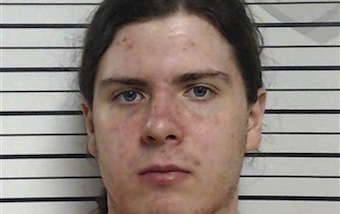Alleged arsonist Matthews
The Rev. Gerald Toussaint, pastor of Mount Pleasant Baptist Church, one of three Louisiana churches burned down over 10 days this month puts it this way: “A lot of people want to make it a hate thing. Well, we don’t represent hate. We represent love. Togetherness. Peace. Long suffering. Hope. That’s what we’re here today to say, not just to our community, but to our country. Be strong.”
Greater Union Baptist Church, St. Mary Baptist Church and Mount Pleasant Baptist Church in St. Landry Parish, Louisiana, were more than 100 years old.
Tourists never flocked to admire them as they did Notre Dame Cathedral in Paris. The flames that burned them to charred ruins were not observed in horror by an international television audience.
But burn they did, all within a span of 10 days; and unlike the fire that damaged Notre Dame, the fires that consumed them were deliberately set by someone motivated by racial hatred, according to authorities.
In response to billionaires pledging to fund the rebuilding of Notre Dame, activists were inspired to raise money for the Louisiana churches – contributions can be made through GoFundMe. The arsons are part of an ongoing spike in hate crimes that began in 2015, fueled by racist rhetoric throughout the Presidential campaign that continued into the first year of the current administration.
The destruction of Black churches, the spiritual and cultural heart of many Black communities, has long been a tactic of white supremacist terrorists, predating the Civil War. Churches were the gathering places for civil rights activists in the 1950s and 1960s. The 16th Street Baptist Church bombing in 1963, which killed four young girls gathered for worship, marked a turning point in the Civil Rights Movement and galvanized support for he Civil Rights Act of 1964.
At the end of last year, the FBI reported that hate crime reports increased 17 percent in from 2016 to 2017, the third consecutive year reports have risen. Of the more than 7,100 hate crimes reported in 2017, nearly three out of five were motivated by race and ethnicity.
That’s not the only sign that violent racial and ethnic hatred are on the rise. The Southern Poverty Law Center reports a nearly 50 percent increase in the number of white nationalist groups in the U.S. in just a single year, from 100 chapters in 2017 to 148 in 2018.
The Anti-Defamation League reports a 182 percent increase in incidents of the distribution of white supremacist propaganda, and an increase in the number of rallies and demonstrations by white supremacy groups, from 76 in 2017 to 91 in 2018. The number of terrorist attacks in the United States by far-right actors, including white supremacists, quadrupled between 2016 and 2017, according to the Center for Strategic and International Studies.
The U.S. House Judiciary Committee convened a hearing last week on the rise of white nationalism. Kristen Clarke, President and Executive Director of Lawyers’ Committee for Civil Rights Under Law, testified, “The violence that erupted in Charlottesville in 2017 was a wake-up call that demonstrated that racial violence continues to stand as a threat to our democracy and presents a danger to vulnerable communities.”
She called on the FBI to redouble its efforts to fight racist extremism. She called on Congress to “encourage the use of existing laws to investigate and prosecute acts of hate violence to the full extent of the law and oppose efforts to create new legislation that risks the further criminalization of communities of color.” She called on social media companies to terminate “purveyors of hate who violate those terms by promoting and inciting violence.”
Unfortunately, her expert testimony was overshadowed by right-wing activist Candace Owens’ absurd and baseless assertion that the “Southern Strategy” — the electoral strategy to increase political support among white voters in the South by appealing to racism – was a “myth.”
Owens’ presence at the hearing is evidence in itself that appealing to racism, or at least the fantasy that racism isn’t a threat — remains a political strategy.
The threat is real, and it is growing. Elected and community leaders across the ideological spectrum need to confront it for the crisis that it is.
Marc H. Morial
President and CEO
National Urban League

